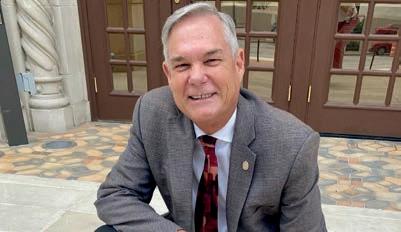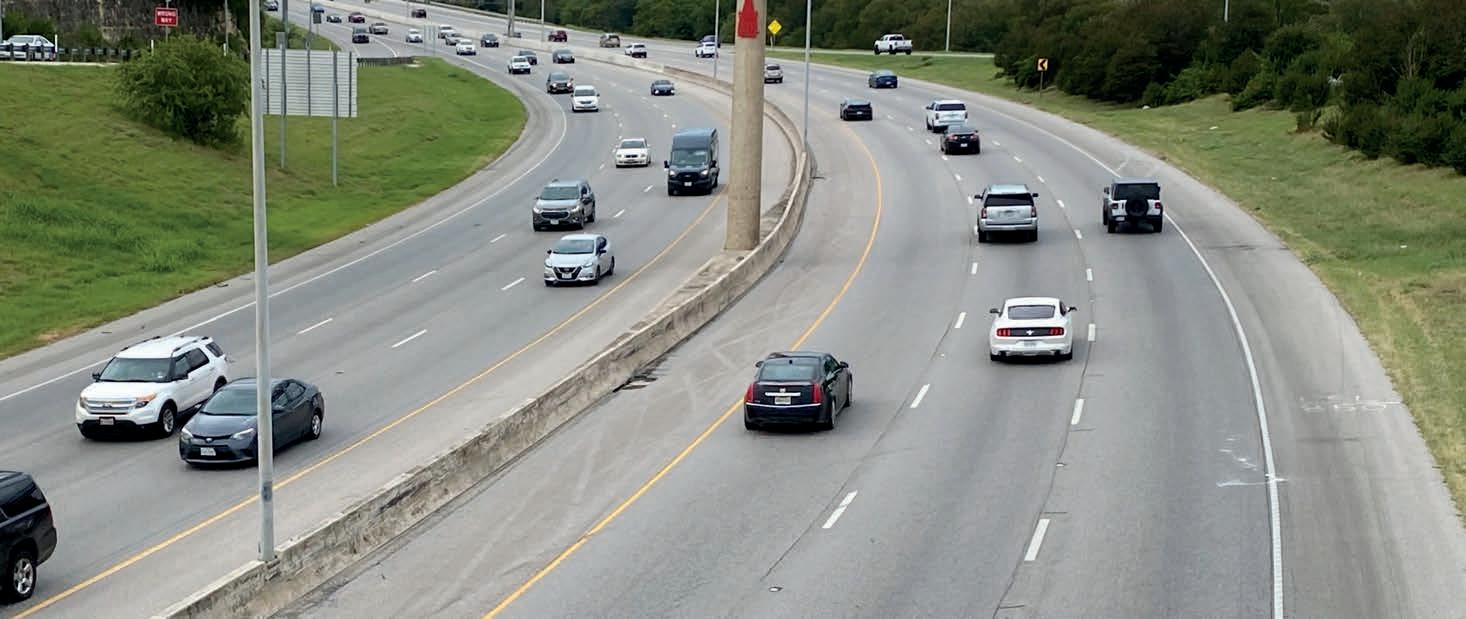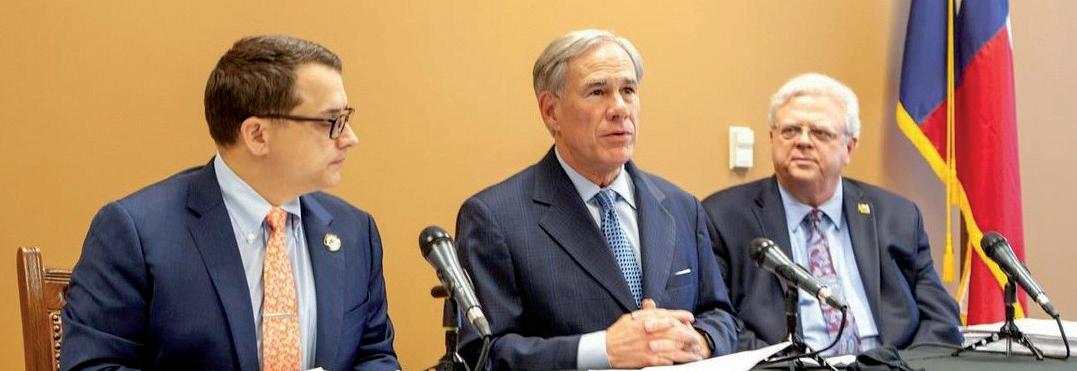
13 minute read
News
HAs the Texas Lege debates the creation and adoption of new congressional maps, the Texas Tribune is reporting that the Republican-run state House is ge ing outside help from a master of the redistricting dark arts: Adam Foltz, an operative who helped craft Wisconsin’s heavily gerrymandered map in 2010. Foltz was hired by the Texas Legislative Council at an annual salary of $120,000 and is reportedly working behind the scenes for the House Redistricting Commi ee, the Trib reports.
HSA has a new mural celebrating one of its most beloved characters: the diminutive impersonator known as “Hispanic Elvis.” Local muralist Colton Valentine painted the mural, which depicts the colorful local celebrity on his trademark bicycle. The image on a wall at 802 San Pedro Ave. replaces Valentine’s depiction of Cardi B.
Advertisement
HIn news that will shock no one, a report issued last week by federal energy regulators shows that Texas hasn’t addressed the root causes of February’s catastrophic power-grid failure. The document recommends that the state make two dozen changes to be er prepare for the coming winter.
A state district judge last week ordered Texas to release 250 migrants arrested in accordance with Gov. Greg Abbo ’s “catch and jail” border policy. The arrested migrants were held in prison for over a month without being charged with any crime, violating both their constitutional rights and Texas law, the judge ruled. As many as 900 migrants arrested after being accused of property crimes were being held without charges last week, the Texas Tribune reports. — Abe Asher
YOU SAID IT!
“What we have is a real domestic violence crisis on our hands. We have a very real homelessness crisis. We’re experiencing a very real sex traffi cking crisis and a very real veteran opioid and mental health crisis. What we’re not facing is a ‘transgender-in-sports’ crisis, because it doesn’t exist. Anyone who tells you that this is a problem in Texas is misinformed or, in the case of [Lt. Gov.] Dan Patrick and Greg Abbott, is trying to misinform you.” — Manny Pelaez,
District 8 San Antonio councilman
Clayton Perry votes ‘no’
Assclown Alert is a column of opinion, analysis and snark.
It’s tempting to write off Clayton Perry, the sole conservative on San Antonio’s largely progressive city council, as a loveable curmudgeon. After all, he’s more folksy than brash in his contrarian stances, not exactly someone prone to Trumpian tantrums.
But Perry’s vote against last week’s council resolution condemning the ugly crusade by Texas GOP leaders to ban transgender kids from school sports is one more reason why we shouldn’t fall into that temptation.
In defending his vote — the only one cast against the resolution — the District 10 councilman argued that he was refusing to back an empty gesture.
“Oftentimes, these resolutions bare no teeth and go beyond the ability and responsibility of council,” he said in a wri en statement. “Potential legislation regarding this issue is currently under review at the state legislature. This resolution, like many others that have come before council, is an a empt to point fi ngers and place blame on our state and federal leaders.”
Perry’s right in one sense: Republicans in the Lege don’t give a shit what San Antonio’s city council has to say about their latest bill to marginalize transgender kids. To be sure, those lawmakers haven’t listened to the parents or experts on school sports who correctly point out that it’s both cruel and unnecessary.
The reality, however, is that political bodies pass resolutions of approval or disapproval all the time. Yes, they’re largely symbolic, but they’re provide moral support for constituents aff ected by the issue. They have value in establishing how a community stands.
While Perry has voted against plenty of resolutions, he’s not universally opposed to them. Last year, he voted for one condemning pandemic-related hate speech, and in 2019 he supported another calling for an end to mass shootings. Did he really believe his vote would abolish either ill?
Perhaps Perry’s opposition to last week’s resolution — like his abstention from one last year declaring racism to be “a public health crisis” — isn’t so much rooted in his opposition to the practice itself as it is in signaling to voters in his conservative-dominated district where he falls on America’s deepening partisan divide.
The Lege’s politically motivated assaults on trans kids aff ects families in Perry’s district, and it’s taking a dark toll. The Trevor Project, a suicide prevention group serving LGBTQ+ young people, said crisis contacts from Texans is up 150% from January 1 through August 30 compared to the same period of 2020.
Council’s resolution ma ers to San Antonio families aff ected by the Lege’s ugly fi xation with punishing transgender kids. If Perry is unwilling to stand up for them, even symbolically, he’s clearly put being a pandering assclown ahead of his role as a public servant. — Sanford Nowlin

Facebook / District 10 Councilman Clayton Perry
news
Ma hew Dowd, former chief strategist for President George W. Bush, last week announced he’ll run as a Democrat for Lieutenant Governor. Dowd said he began considering a run following the January 6 coup a empt. After the Texas Legislature’s hard-right push during its most recent session, Dowd decided to target Republican Lt. Gov. Dan Patrick, whom he called “cruel and craven.” Dowd will have to face Democratic primary voters fi rst; Mike Collier, who came within fi ve points of beating Patrick in 2018, is also exploring a run. The Musicians of the San Antonio Symphony (MOSAS) voted to strike after contract negotiations with the Symphony Society broke down. The musicians rejected the Symphony Society’s off er to cut the orchestra’s compliment of fulltime musicians from 72 to 42, converting 26 of those positions to part-time work and terminating four entirely. The musicians also rejected a previous off er to cut all their paychecks by half. The Symphony Society argues that major cuts are a fi nancial necessity. — Abe Asher

Find more news coverage every day at sacurrent.com

Sanford Nowlin
CITYSCRAPES
Not Attaining
As San Antonio’s air quality once again fails to meet federal standards, it’s time to demand better
BY HEYWOOD SANDERS
The following is CityScrapes, a column of opinion and analysis.
Recently, there’s been a ritual gnashing of teeth and a fl ood of complaints from the Chamber of Commerce amid fresh forecasts of economic doom. Offi cials have shared a troubling report — albeit now four years old — from economist Steve Nivin that estimates billions in costs and economic losses. Some blame outsiders, claiming the real problem lies across the southern border.
No, we’re not talking about a fresh fl ood of migrants coming into South Texas or some grand threat to San Antonio’s future. All that rancor surrounds “nona ainment,” the term used to describe the failure of our metro’s air quality to meet the Environmental Protection Administration’s standard for ground-level ozone.
That standard, set in 2015, is 70 parts per billion. We had until September 24 of this year to meet it. We didn’t.
Now there’s a 30-day comment period, where the state’s environmental “regulator,” the Texas Commission on Environmental Quality, will argue that our failure is actually the result of pollution streaming over from the other side of the border. And, as the Express-News reported, the Chamber of Commerce emphasized in a le er to the EPA that the San Antonio area lowered its ozone level by 20% from 2014 to 2019.
Maybe those parties will succeed in making their case to the feds. If they don’t, the state may go to federal court, as it did in 2018, to overturn an EPA judgment that we’re in nona ainment.
Regardless of the wrangling, the reality is that, once again, San Antonio failed to meet the EPA standard. For all the complaints about having to get our vehicle emissions tested and about additional requirements for “point sources” such as power plants and quarries, the truth is this: our air is dirtier and unhealthier than it should be. Despite the court decision upholding the 70-parts per billion standard, we haven’t managed to move our air quality for years. While our ozone level dropped from 81 in 2013 to 73 in 2016, progress has essentially stalled. It was the same 73 in 2019 and about the same in 2020.
We dealt with the easier emission sources years ago. But as the Alamo Area Council of Governments noted in a 2019 report, “On-road vehicles have traditionally represented the significant source of [nitrous oxide] in the region.” As our metro continues growing, spreading urban growth outward, we drive more every year — albeit with a downward “blip” in 2020 due to the pandemic.
Living in Monte Vista near U.S. Highway 281, I see and hear the impact of that growth every day.
Once the highway was terribly congested northbound in the late afternoon as downtown workers left for homes in Stone Oak and beyond. Now, the southbound traffi c clogs up after 4 p.m., the result of construction and maintenance workers returning south of downtown from new subdivisions well beyond Loop 1604.
Then there’s all the crosstown traffi c as workers head home to the far West Side from job centers around the Medical Center, UTSA’s main campus and Stone Oak.
What we’ve built over the years is a highly dispersed city with multiple job centers. And we’ve done it with public policy and public subsidies. The property tax abatements to Citibank and Microsoft at Texas Research Park, along with more recent breaks for the Kohl’s operations center at Rogers Run and others, all contributed to San Antonio’s spread.
The city government and local public agencies also continue to boost the fortunes of favored local developers. For example, University Health District announced the purchase of land next to the Texas A&M-San Antonio campus south of Loop 410. That’s where the early developers of the Verano tax increment zone, approved in 2007, promised to produce “2,542 single-family detached homes, 3,375 multi-family homes, 1,021 condos/town homes, 5,977,200 square feet of commercial, and the new Texas A&M,” not much of which happened.
The Chamber isn’t going to stop wailing as we once again deal with nona ainment. But it’s time for the rest of us to stand up and say that we want cleaner air, that we want less asthma and respiratory disease and that we value public health at least as much as private developers’ gain.
Heywood Sanders is a professor of public policy at the University of Texas at San Antonio.
Paying for the Probe

Texas taxpayers likely face a steep bill for ‘election audit’ Trump ordered from Gov. Greg Abbott
BY SANFORD NOWLIN
While Texas offi cials have yet to explain how they’ll pay for their recently announced probe into the 2020 election results in four of the state’s most-populous counties, evidence suggests it won’t come cheap to taxpayers.
On September 23, former President Donald Trump issued an open le er demanding a “forensic audit” of the 2020 election in Texas, a state he handily won. Hours later, in a statement echoing Trump’s “forensic audit” language, the Texas Secretary of State’s Offi ce said it would probe the election results in Dallas, Collin, Harris and Tarrant counties, three of which were won by President Joe Biden.
The probe comes under the watch of Republican Gov. Greg Abbo , a Trump ally running for reelection in 2022. It’s the latest so-called “forensic audit” ordered up by GOP state lawmakers as Trump continues to push discredited lies that widespread fraud cost him the 2020 election.
This summer, a 30-page nonpartisan report documented the high cost of the investigations ordered up by Trump-coddling lawmakers. A collaboration between the left-leaning Brennan Center for Justice, center-right R Street Institute and nonpartisan anti-authoritarian watchdog Protect Democracy, the study also found that in some states, unaccredited contractors were allowed to access voting machines.
Arizona’s recently completed investigation alone had already racked up $2.4 million in expenses at the time of the report’s July 8 street date. Much of that price tag comes down to Maricopa County being required to replace its voting machines after they’d been “compromised by this interference.”
The months-long review by a fi rm called Cyber Ninjas in late September confi rmed that Joe Biden had won both Maricopa County and the state by more votes than counted in the initial tally. Earlier in the summer, Cyber Ninjas also revealed that Trump-supporting groups had kicked in $5.7 million to fund its work, while the state Senate had funneled it $150,000 for the eff ort.
“The takeaway is that this was a colossal waste of time,” Arizona Secretary of State Katie Hobbs told Politico. “And anyone who is considering replicating it in their state, or taking further action based on this report, should not be considered a serious leader.”
Instagram / @GovAbbott
According to the same report, a statewide probe ordered up by Republican lawmakers in Wisconsin is estimated to run more than $63,000 and could expand statewide.
That Wisconsin price tag appears poised to go up further, according to news reports. Late last month, Republicans who control the Wisconsin Legislature began seeking approval to spend up to $680,000 in taxpayer money to bankroll the investigation.
Meanwhile, the report estimated the cost of Pennsylvania’s ongoing Republican-ordered election investigation at $25,000. However, Philadelphia offi cials have warned that the city could be forced to replace $40 million in voting machines compromised during the process, Reuters reported.
Michigan’s GOP-backed probe has so far generated an estimated price tag of $5,000, the report states. However, Republican lawmakers in that state’s legislature are also pushing for legislation that would appropriate $2.5 million in funding for the project.
The cost of Georgia’s review was unclear at the time data was compiled, according to the report.
Just as alarming as the expense of the audits are what Republican offi cials are ge ing for their money, the report warns. The partisan reviews examined by the study failed basic standards of objectivity, transparency and competence, according to the authors.
“[T]he procedures proposed for these reviews are not designed to obtain secure and accurate results and are radically diff erent from proven election integrity procedures, such as post-election tabulation audits, routinely conducted by election offi cials across the country,” the report notes. “That these eff orts are gaining traction more than six months after certifi cation of the election is a blinking red warning light.”
Calling out Abbott
That high price tag for partisan election probes didn’t go unnoticed by journalist Chris Wallace, who quizzed Abbo in late September during the governor’s appearance on normally GOP-friendly Fox News Sunday.
“Isn’t it just a terrible waste of taxpayer money to have an audit in a state that everybody says went fi ne and that President Trump won by 600,000 votes, and aren’t you contributing to this undermining confi dence in our election process?” Wallace asked.
Abbo ducked the question, instead asserting that because governments regularly audit other functions, they should also do so for elections.
Even though Texas’ announcement of its probe came mere hours after Trump shared an open le er demanding an audit of the Texas results, Abbo asserted to Wallace the probe was unrelated to the former president’s request.
“They actually began months ago because the secretary of state of Texas has an obligation to make sure that we do conduct audits in the state of Texas,” Abbo said.



